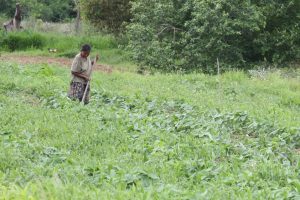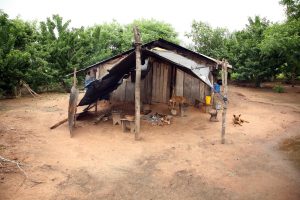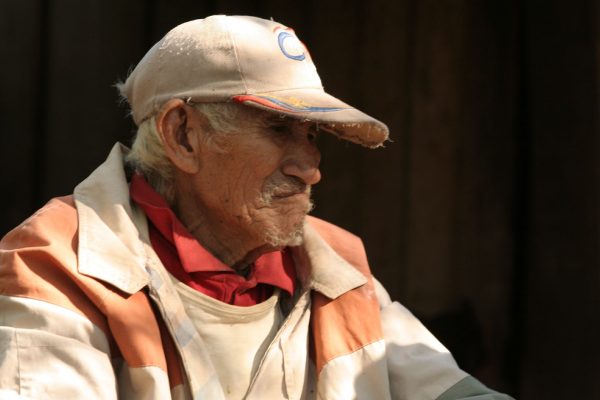The Sanapaná live and die with no clear gospel witness in their own language and culture. While visiting this tribal community, our friends took us for a walk around the village. At the end of a path was our ultimate destination, a man the missionaries called “Grandpa.” We brought fresh tereré along with us in case he was up for a visit. Along the way we met many who were busy doing regular activities such as gardening, or working around their houses. It was great fun meeting members of this community! As we walked on, we couldn’t help but realize that perhaps every single person we met was “lost.” The needs gripped our hearts as we continued on our way from house to house.
 Eventually, we came to the end of the path. We had arrived at grandpa’s house. There he sat, an old man, sitting slumped in a crooked, wooden chair with a hat on and his head down. He had coke bottle glasses that were so scratched up that one could hardly see through them. He had gone blind in recent years. My friend, John, who speaks the Sanapaná language, asked if he’d like to drink tereré. “It’s too cold.” grandpa responded. He was layered with coats and sweaters, and it was a chilly mid 60’s day if I remember right; but the sun was warm. “Did you sit in the sun today to warm up?” John asked him. Grandpa laughed and said, yes. The two of them talked and talked as I sat and listened to the strange sounds and noises of a language that only the Sanapaná themselves, four English speakers, and God understand. As I sat, I couldn’t also help but notice my surroundings, I was in the midst of hardship and darkness. Grandpas feet were cracked and misshapen, his nails caked with dirt underneath them, his wooden house sat crookedly with black plastic around the front of it and a small fire in the middle to help collect the heat. Skinny, straggly dogs laid curled up around the fire attempting to keep warm, blood stains and flies were evident on their bodies from the fight for food, and it was no different for grandpa himself. He has worked in the hot Chaco sun his entire life. John told me that gardening used to be one of his favorite things to do. Toward the end of our visit, grandpa told John to tell me, “That young missionary needs to learn our language so we can talk.” He repeated this phrase several times throughout their time visiting together. After 20 or so minutes of visiting, it was time to go. We stood up to leave and John reached down and grabbed his hand to say goodbye, and I followed suit. Our time visiting with grandpa had come to an end.
Eventually, we came to the end of the path. We had arrived at grandpa’s house. There he sat, an old man, sitting slumped in a crooked, wooden chair with a hat on and his head down. He had coke bottle glasses that were so scratched up that one could hardly see through them. He had gone blind in recent years. My friend, John, who speaks the Sanapaná language, asked if he’d like to drink tereré. “It’s too cold.” grandpa responded. He was layered with coats and sweaters, and it was a chilly mid 60’s day if I remember right; but the sun was warm. “Did you sit in the sun today to warm up?” John asked him. Grandpa laughed and said, yes. The two of them talked and talked as I sat and listened to the strange sounds and noises of a language that only the Sanapaná themselves, four English speakers, and God understand. As I sat, I couldn’t also help but notice my surroundings, I was in the midst of hardship and darkness. Grandpas feet were cracked and misshapen, his nails caked with dirt underneath them, his wooden house sat crookedly with black plastic around the front of it and a small fire in the middle to help collect the heat. Skinny, straggly dogs laid curled up around the fire attempting to keep warm, blood stains and flies were evident on their bodies from the fight for food, and it was no different for grandpa himself. He has worked in the hot Chaco sun his entire life. John told me that gardening used to be one of his favorite things to do. Toward the end of our visit, grandpa told John to tell me, “That young missionary needs to learn our language so we can talk.” He repeated this phrase several times throughout their time visiting together. After 20 or so minutes of visiting, it was time to go. We stood up to leave and John reached down and grabbed his hand to say goodbye, and I followed suit. Our time visiting with grandpa had come to an end.
 Life certainly hasn’t been “fair” to grandpa, nor to the rest of the Sanapaná nation. Imagine for a moment, being stranded on an island, away from the rest of civilization, away from the commodities of North America, and being forced to live life separated from the rest of the world. The quest for food is a 24/7, 365 day struggle, health and wealth are nigh to impossible to find, and even worse, you have no gospel, and no concept of who Jesus Christ is. Sure, maybe you’ve heard some things, but nothing clear. Being pragmatic and forced into a life of animism, you take this “Jesus” and add him to your list of rituals. You live in darkness, with no hope.
Life certainly hasn’t been “fair” to grandpa, nor to the rest of the Sanapaná nation. Imagine for a moment, being stranded on an island, away from the rest of civilization, away from the commodities of North America, and being forced to live life separated from the rest of the world. The quest for food is a 24/7, 365 day struggle, health and wealth are nigh to impossible to find, and even worse, you have no gospel, and no concept of who Jesus Christ is. Sure, maybe you’ve heard some things, but nothing clear. Being pragmatic and forced into a life of animism, you take this “Jesus” and add him to your list of rituals. You live in darkness, with no hope.
This is a daily reality for not only the Sanapaná, but every single tribe that lives in the Chaco (and around the world). Sure, there’s no literal island, in fact the Chaco is practically a desert, but one could make the argument that they do live on the island of isolation. This is seen by their geographical location, along with their linguistic and cultural isolation. It is here that people like the Sanapaná wait. They wait for help, they wait for true love (the love of Jesus Christ), and most of all, they wait for the life giving gospel message. Who will tell them?
Who will tell grandpa that Jesus has paid his death penalty?
